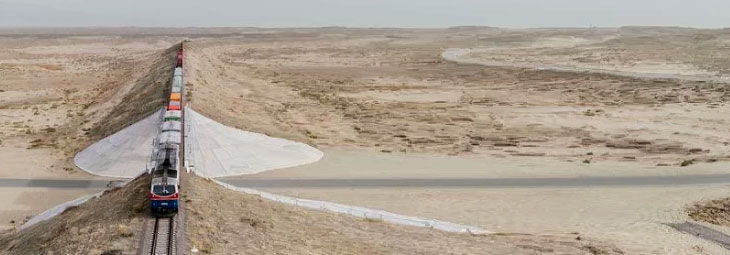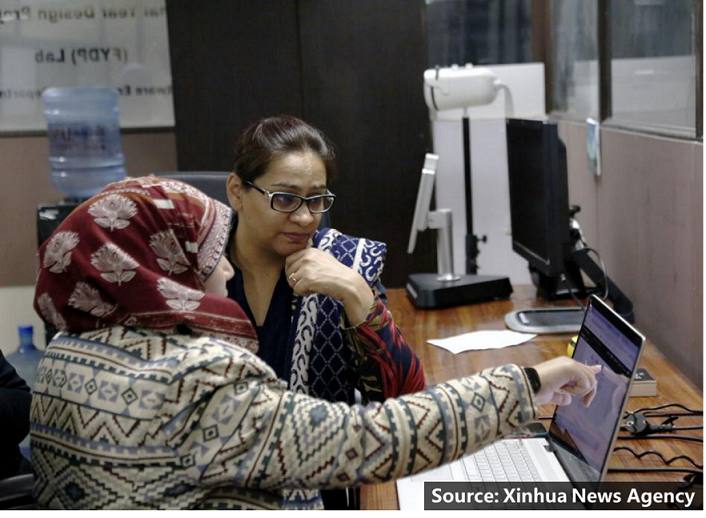


On January 19, at the China-Pakistan Intelligent Systems Laboratory at the National University of Sciences and Technology in Islamabad, Syed Ratif (right), the Pakistani head of the laboratory and associate professor at the National University of Sciences and Technology, interacts with students.
Against the backdrop of the Belt and Road Initiative and the China-Pakistan Economic Corridor, Chinese and Pakistani researchers are leveraging artificial intelligence (AI) technology to assist Pakistan in building smarter and safer cities.
Linking researchers from both countries is the China-Pakistan Intelligent Systems Laboratory located in Islamabad, the capital of Pakistan. Established in 2022, the laboratory is a collaborative project jointly built by the National University of Sciences and Technology in Pakistan and the Guangzhou Institute of Software Technology in China. Wu Jun, the head of the laboratory on the Chinese side, stated that through this platform, China aims to integrate mature research results with local projects in Pakistan, cater to Pakistan's demands in areas like security, and provide smart city-related products and intelligent solutions. This initiative aims to implement core technologies and products such as smart streetlights and intelligent video systems in Pakistan, thereby enhancing Pakistan's urban governance capabilities.
"Cooperation in the field of technology is crucial for Pakistan's socio-economic development," said Syed Ratif, the Pakistani head of the laboratory and associate professor at the National University of Sciences and Technology. She mentioned that China leads the world in the AI industry, while Pakistan possesses immense potential in technological development. By deepening cooperation with China, Pakistan can make significant strides in technology and has the potential to become a hub for AI development in South Asia. Ratif stated that the laboratory is currently utilizing mature technologies from China to develop efficient traffic management systems, infrastructure monitoring systems, and other smart city projects in Pakistan. Presently, the license plate recognition system and security system developed by the laboratory have begun pilot applications in Pakistan, offering more Pakistani residents the safety and convenience.
Since its establishment, the laboratory has continuously produced fruitful results from scientific cooperation between China and Pakistan. Wu Jun explained that considering Pakistan is often plagued by floods, the laboratory has brought together outstanding scientists and engineers from both China and Pakistan to develop a significant research outcome: the "Unmanned Aerial Vehicle-Assisted Edge Framework for Real-time Disaster Management," providing Pakistan with more scientific and effective disaster response strategies. Besides providing solutions for urban issues, the laboratory is also committed to utilizing AI technology to help Pakistan improve the efficiency of its medical system, enhance the experience of patients and caregivers, and reduce the continuously rising costs of care. Wu Jun stated that apart from technology going global, another purpose of establishing the laboratory is to promote talent exchange and cultivation. "Both China and Pakistan have established a model of collaborative offices and long-term mutual visits. Currently, the laboratory has recruited four outstanding Pakistani postdoctoral researchers to work long-term in Guangzhou, and we will continue to recruit students in the future." Mohammed Turya Khan is one of them. He has been working as a researcher at the Guangzhou branch of the China-Pakistan Intelligent Systems Laboratory for nearly six months and is eager to bring more advanced Chinese technology back to Pakistan for the benefit of society.
At the laboratory of the National University of Sciences and Technology in Pakistan, Sahaar Elshad, a researcher, expressed that Sino-Pakistani scientific research cooperation is progressing vigorously. "We are engaging in various exciting projects with China, including activity detection, gait recognition, automatic license plate detection, and waste management."
Source: <https://www.yidaiyilu.gov.cn/p/0GHLR0CS.html>
Edited and Translated by Li Wei